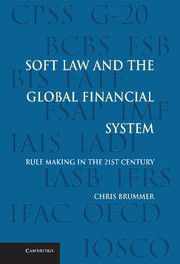Book contents
- Frontmatter
- Contents
- Acknowledgments
- Key Abbreviations
- Introduction The Perils of Global Finance
- 1 Territoriality and Financial Statecraft
- 2 The Architecture of International Financial Law
- 3 A Compliance-Based Theory of International Financial Law
- 4 How Legitimate Is International Financial Law?
- 5 Soft Law and the Global Financial Crisis
- 6 The Future of International Financial Law
- Index
- References
1 - Territoriality and Financial Statecraft
Published online by Cambridge University Press: 05 June 2012
- Frontmatter
- Contents
- Acknowledgments
- Key Abbreviations
- Introduction The Perils of Global Finance
- 1 Territoriality and Financial Statecraft
- 2 The Architecture of International Financial Law
- 3 A Compliance-Based Theory of International Financial Law
- 4 How Legitimate Is International Financial Law?
- 5 Soft Law and the Global Financial Crisis
- 6 The Future of International Financial Law
- Index
- References
Summary
International (global) financial law cannot be fully understood without first examining how financial regulation is administered at the domestic (national) level. This is not only because national governments and regulatory agencies are ultimately responsible for coordinating international policy and implementing it, a point that we explore in the following chapters. It is also because national regulatory authorities can, under the right circumstances, leverage their own capital markets and formal legal dictates in ways that export their own regulatory preferences, allowing them to become unilateral sources of international financial law. Their ability to do so informs as a result both how and when regulators coordinate policies with foreign counterparts.
In light thereof, this chapter identifies and catalogues some of the regulatory strategies employed by national financial authorities to oversee not only local markets and market participants, but also foreign actors, and examines how these tools affect incentives to cooperate across borders. The chapter begins by showing that the primary tools for regulatory oversight are grounded in notions of “territoriality,” with jurisdiction over markets and market participants being tied to events occurring in, or associated with, certain geographic markers. It then argues that, contrary to traditional theories of globalization that view territoriality as a limitation of regulatory authority, territoriality in practice constitutes a diverse array of tactics that, especially for regulators of large capital markets, can be leveraged to exert authority unilaterally over both mobile market participants and other foreign regulators. Territoriality can, as such, be understood as a means of not only controlling local geographic spaces and markets, but also of projecting economic regulatory power abroad. Nevertheless, the chapter shows how financial globalization has complicated both territorial and extraterritorial applications of national law by both increasing the evasive power of regulated market participants and by reallocating financial and regulatory power around the world. This “democratization” of capital has, on the one hand, resulted in new expenditures and made the task of regulation more demanding, even among traditional economic superpowers, but it has also, on the other, increased incentives for better-coordinated intergovernmental cooperation.
- Type
- Chapter
- Information
- Soft Law and the Global Financial SystemRule Making in the 21st Century, pp. 22 - 59Publisher: Cambridge University PressPrint publication year: 2011



